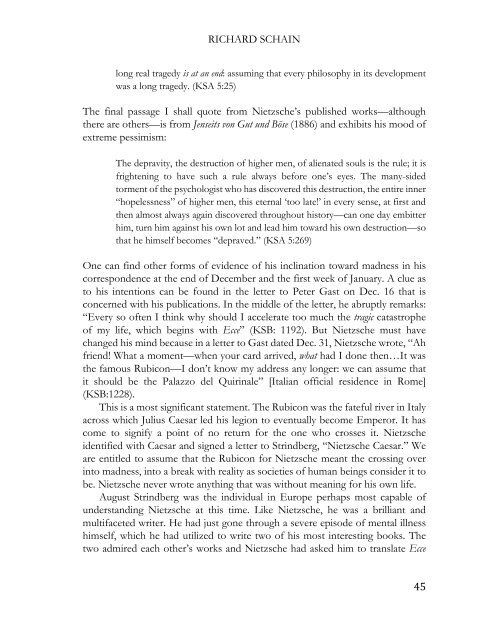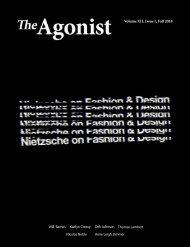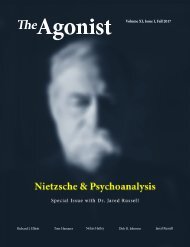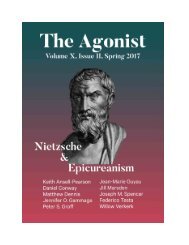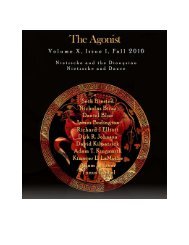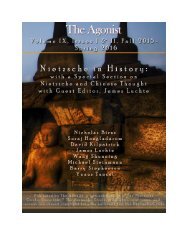Volume XII, Issue II, Spring 2019
You also want an ePaper? Increase the reach of your titles
YUMPU automatically turns print PDFs into web optimized ePapers that Google loves.
RICHARD SCHAIN<br />
long real tragedy is at an end: assuming that every philosophy in its development<br />
was a long tragedy. (KSA 5:25)<br />
The final passage I shall quote from Nietzsche’s published works—although<br />
there are others—is from Jenseits von Gut und Böse (1886) and exhibits his mood of<br />
extreme pessimism:<br />
The depravity, the destruction of higher men, of alienated souls is the rule; it is<br />
frightening to have such a rule always before one’s eyes. The many-sided<br />
torment of the psychologist who has discovered this destruction, the entire inner<br />
“hopelessness” of higher men, this eternal ‘too late!’ in every sense, at first and<br />
then almost always again discovered throughout history—can one day embitter<br />
him, turn him against his own lot and lead him toward his own destruction—so<br />
that he himself becomes “depraved.” (KSA 5:269)<br />
One can find other forms of evidence of his inclination toward madness in his<br />
correspondence at the end of December and the first week of January. A clue as<br />
to his intentions can be found in the letter to Peter Gast on Dec. 16 that is<br />
concerned with his publications. In the middle of the letter, he abruptly remarks:<br />
“Every so often I think why should I accelerate too much the tragic catastrophe<br />
of my life, which begins with Ecce” (KSB: 1192). But Nietzsche must have<br />
changed his mind because in a letter to Gast dated Dec. 31, Nietzsche wrote, “Ah<br />
friend! What a moment—when your card arrived, what had I done then…It was<br />
the famous Rubicon—I don’t know my address any longer: we can assume that<br />
it should be the Palazzo del Quirinale” [Italian official residence in Rome]<br />
(KSB:1228).<br />
This is a most significant statement. The Rubicon was the fateful river in Italy<br />
across which Julius Caesar led his legion to eventually become Emperor. It has<br />
come to signify a point of no return for the one who crosses it. Nietzsche<br />
identified with Caesar and signed a letter to Strindberg, “Nietzsche Caesar.” We<br />
are entitled to assume that the Rubicon for Nietzsche meant the crossing over<br />
into madness, into a break with reality as societies of human beings consider it to<br />
be. Nietzsche never wrote anything that was without meaning for his own life.<br />
August Strindberg was the individual in Europe perhaps most capable of<br />
understanding Nietzsche at this time. Like Nietzsche, he was a brilliant and<br />
multifaceted writer. He had just gone through a severe episode of mental illness<br />
himself, which he had utilized to write two of his most interesting books. The<br />
two admired each other’s works and Nietzsche had asked him to translate Ecce<br />
45


